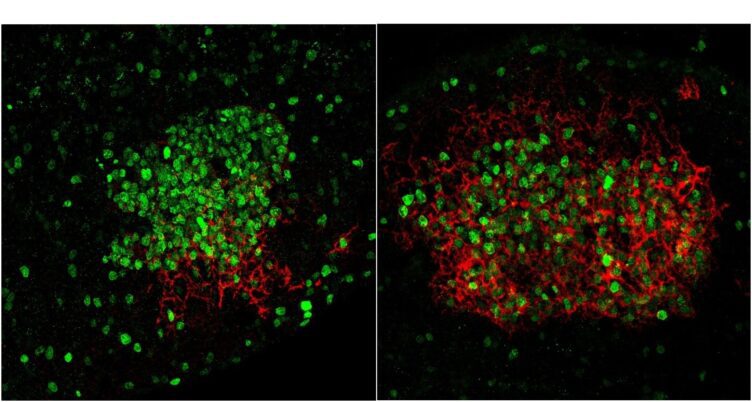The molecule on which a possible new therapy against melanoma is based also plays a key role in the treatment of autoimmune diseases.

 Germinal center with normal structure on the left and aberrant due to the absence of NGFR on the right. B lymphocytes in the process of maturation are shown in green, and cells forming the structure are shown in red. /Alberto Hernandez. CNIO
Germinal center with normal structure on the left and aberrant due to the absence of NGFR on the right. B lymphocytes in the process of maturation are shown in green, and cells forming the structure are shown in red. /Alberto Hernandez. CNIO
The protein is called NGFR. CNIO researchers have discovered for the first time that blocking it reduces metastasis (in animals), and they are developing a possible drug that does just that.
Now they have discovered that NGFR has another side: without it, the body’s defense cells do not learn to recognize the enemy and, therefore, a good immune response is not generated.
The goal is to develop new NGFR-based therapies against both cancer and autoimmune diseases.
Three years ago, in 2021, the Microenvironment and Metastasis Group of the National Center for Cancer Research (CNIO) discovered what could be one of the first treatments for melanoma metastases in the early stages. Researchers led Hector Peinadodiscovered one of the key molecules responsible for setting the stage in the part of the body where a tumor will proliferate, and in animal models they confirmed that blocking it reduces metastasis.
The molecule in question is called NGFR. Over the years, they have tested the effectiveness of the compound to prevent its effects and that it is non-toxic. They are now preparing “a publication that will present the results of its use in combination with immunotherapy for the treatment of melanoma,” says Peinado.
NGFR may also serve as a biomarker for early metastasis of melanoma, which will predict disease progression.
But while research progresses in this direction, the CNIO team also wanted to understand what the NGFR molecule does in a healthy body when there is no cancer. Thus, they have just discovered that NGFR is also key to the body’s development of an effective immune response and that it may be an important target for controlling autoimmune diseases.
They just published it in a magazine Cell reportsin an article with Alberto Hernandez as first author.

Without NGFR, defense cells do not train well
“While we were developing anti-metastasis therapies, we noticed that blocking NGFR led to lymph node hypertrophy, and we decided to study this phenomenon,” Peinado explains.
Lymph nodes are an important part of the immune system, the main place where protective cells, lymphocytes (white blood cells), are exposed to molecules of infectious agents in order to learn to recognize them. Published research suggests that NGFR plays an important role in this process.
“B cells are like soldiers that trigger antibodies and help us defend against pathogens and infections. But to be effective, lymphocytes must be trained and selected in specific structures in the lymph nodes called germinal centers. When NGFR is absent, these structures are clearly abnormal and lymphocytes do not mature properly. As a result, instead of attacking pathogens, lymphocytes end up shooting at the body itself,” says Hernandez.
NGFR modulates the body’s defense response
CNIO researchers have created mice that lack NGFR. These animals develop defenses against the healthiest organism, which occurs in autoimmune diseases such as lupus and Crohn’s disease.
“This tells us that NGFR regulates the effectiveness of the immune response,” Peinado explains. “When NGFR is eliminated, the animal responds less effectively, which is why autoimmunity develops.”
The work advances the understanding of this molecule’s role as a modulator of the immune response and reveals a link between NGFR and autoimmune diseases. It’s also “another step toward understanding the connection between the immune system and cancer,” Peinado says.
The immune response is associated with the ability to defeat the tumor. The goal here is to “develop new therapies that modulate NGFR levels to generate effective antitumor responses and reduce the development of autoimmune diseases.”
The researchers believe that if the ideal balance is achieved, the strategy of blocking NGFR will become more effective and allow the development of new treatments.
Return to news
